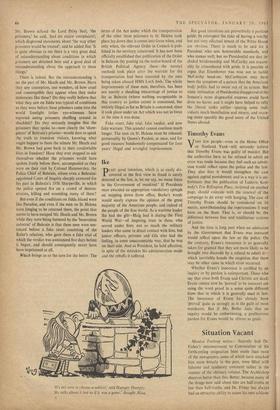Situation Vacant
Monica Furlong writes : Scarcely had Dr. Fisher's announcement to Convocation of his forthcoming resignation been made than most of the newspapers, some of which have attacked him most bitterly in the past, were filled with fulsome and laudatory comment rather in the manner of the obituary column. The Archbishop deserves better than this. Better, because many of the things now said about him are half-truths or less than half-truths, and Dr. Fisher has always had an attractive ability to assess his own achieve- ments and limitations with unblinking objectivity. He is not, for instance, as journalists have described him 'far and away the best after-dinner speaker in the country,' his public image has not been that of a 'man of the people,' and where those inside and outside his own Communion have admired him, it has not been for his 'fear- less public comment.'
What many Anglicans have long wanted to see in their Archbishop is a man genuinely 'of the People' in the sense that he is not entirely con- ditioned to the Establishment; a man who is just as fearless, even rash, in commenting on apart- heid in South Africa as on the easy target of adultery in this country; a man whose after- dinner performances are neither here nor there.
Dr. Fisher's talents have been of the safer kind—though not necessarily to be despised for that; the sort that keep the social wheels oiled. His warmth and kindness have tamed everyone in the end—High Churchmen, Free Churchmen, Orthodox Patriarchs, even. Popes—and where contemporaries have gone out of their way to be rude to him he has had a disconcerting way of appearing not to notice. His clear brain has reformed the monster of Lambeth administra- tion, the cruel, unwieldy beast which killed his more sensitive predecessor. On occasions where the Church has been on public view—Royal weddings, the Coronation and the like—many of his fellow-churchmen have heaved grateful sighs that he could be relied on to carry out the Church's part with such grace and competence, and they have been grateful, too, that he has had the Establishment gift of the gab and ability for consorting equally With all sorts of people.
Where he has sometimes dismayed is in his lack of enthusiasm for spiritual exploration— fair-mindedness has often appeared to take supremacy over more specifically Christian vir- tues; and in his knack of reducing agonising human problems to the dry terms of Socratic discussion. He complains gently that no one ever tires of reminding him he was a schoolmaster, but in the end his gifts and faults are unmistak- ably those of his old profession. Painstaking, kindly, paternal on the one hand, he has been in danger of seeing the world at one remove on the other. The humbling and often frustrating experience of a parish priest, obliged to care not for children l'ut for adults, has been left out of his career.
What of his successor? What the Church needs now is a man able to redress the balance on the side of spirituality. Able also to come ener- getically to grips with international and political Problems, without simultaneously 'doing a Canon Collins.' Brains, administrative ability and a Public impression of virility and self-confidence would be useful. The man who most snugly fits the need is the Most Reverend Joost de Blank, Archbishop of Cape Town, though the Church ThaY have some scruples about lifting him from his heart-rending task in South Africa. He is already known outside clerical circles as the tycoon Archbishop, an astonishingly efficient man with an unclerical taste for fast cars, abstract art and good food and drink. Infinitely more important, he has a strain of deep spiritu- a.ntY, a tough puritan conscience, and a reputa- tion for intelligent fearlessness.



































 Previous page
Previous page